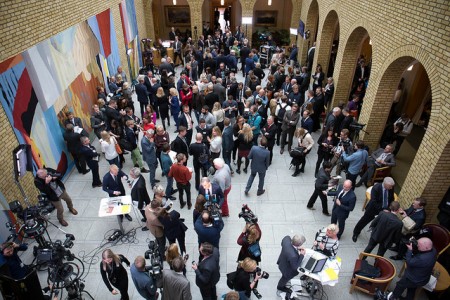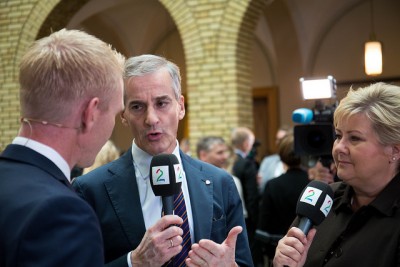NEWS ANALYSIS: Presentation of the government’s state budget always meets a chorus of critics from opposition parties. It’s their job to look for things to complain about, but this year they’re being challenged by a wide range of economists who have given the budget a solid thumbs-up, even though it’s been pumped up by more oil money than ever before.

Newspaper Dagens Næringsliv (DN) reported Thursday that 11 out of 14 economists responding to a questionnaire about the budget gave it high marks. Six of them gave Finance Minister Siv Jensen’s proposed state budget for 2016 a score of five on a scale of zero to six, while only two gave it a three. The other six landed at four.
“The business cycle now calls for an expansive budget, despite the risk of an unwanted strengthening of the krone,” Kjersti Haugland, senior economist at DNB Markets, told DN. “This budget appears well-balanced.”
The krone was strengthening a bit against the dollar on Thursday after remaining stable on Wednesday when the budget was first released. By Thursday afternoon, it cost NOK 8.19 to buy one US dollar, down from NOK 8.24 after the budget was released and NOK 8.45 just a week ago. Most economists and business owners now want the krone to remain weak, since that takes the sting out of Norway’s high prices and makes Norwegian goods and services more competitive abroad.
‘Sensible’ to spend more oil money right now
The vast majority of economists polled nonetheless believe it’s sensible to spend more oil money now as a means of countering unemployment, which has been rising since oil prices fell and oil companies started downsizing. Fully nine out of the 14 economists polled said they agreed that oil revenues could be used in a manner that would contribute to long-term growth. Ten of the 14 also agreed with Jensen’s own claim that her budget was well-suited for the challenges now facing the Norwegian economy,
Only the economist from the trade union confederation LO, which is closely alligned with the opposition Labour Party, and the independent Samfunnsøkonomiske analyse gave Jensen the lower scores. “It looks like it was more important (for the government) to offer tax relief instead of solving challenges,” responded Roger Bjørnstad of the latter, while LO economist Stein Reegård attributed Jensen’s tapping of the oil fund to campaign promises, the government’s minority position and ideology.
The most important signs of support for the budget, though, came from the government’s two parties that the government relies upon to stay in office, the Liberals and the Christian Democrats. Last year’s budget set off serious conflicts between them and the two government parties, the Conservatives and Jensen’s Progress Party, but Hans Olav Syversen of the Christian Democrats indicated the reaction now was far friendlier. “There will be less fighting this year,” he told newspaper Aftenposten. “We’ll head into budget negotiations with a blank slate.” The Liberals want more money earmarked for environmental and climate projects but also seemed positive. “We must try to finance future budgets without using so much oil money,” the Liberals’ Terje Breivik cautioned, though, adding that he was also keen to boost climate-related taxes to cut emissions.

While some economists and business leaders think Norway’s economy will improve as early as next year, the socialist opposition parties weren’t so optimistic and were predictably keen to pick the budget apart. Most chided the government for “greasing the budget with oil money,” even though Jensen’s proportional use of the oil fund’s resources (2.8 percent) is far less than Labour-led governments have used in the past. Their biggest criticism was that the conservative government, for the first time, was using more oil money than the amount generated this year because of lower oil prices. That’s not sustainable, and Jensen was accused of robbing Norway’s piggy bank. She retorted that the piggy bank itself is getting fatter every year.
Both Jensen and her government colleagues agree that this year’s budget called for some extraordinary measures, because of the oil price shock, that are unlikely to be repeated. And even Labour Party leader Jonas Gahr Støre had to concede that it can be wise to use money on needed maintenance and improvement projects that also will create jobs. “There are many things we can give a nod to,” he told newspaper Dagsavisen. While Labour and other left-wing parties also hammered away at tax relief, they acknowledged that it didn’t amount to much for the vast majority and they seemed to overlook the government’s call tougher taxation on the roughly 30,500 Norwegians who earn more than NOK 2 million a year. They face more onerous taxation, but not more than 50 percent of gross income.
Journalist Halvor Hegtun, writing in Aftenposten, called the annual release of the budget “A National Day for Dissatisfaction,” as opposition politicians, organizations, lobbyists and journalists kept searching for things to complain about in the budget. In some cases it went too far, or was over-exaggerated: Karl Eirik Schjøtt-Pedersen, the former Labour Party minister who now heads the oil industry’s major trade association Olje og gass, had decided not to be too critical and was taken aback when VG Nett headlined the opposite. “That seemed stronger than intended,” he said. “We had even chosen not to use the word ‘disappointed.'”
newsinenglish.no/Nina Berglund

